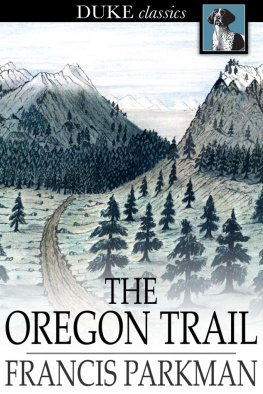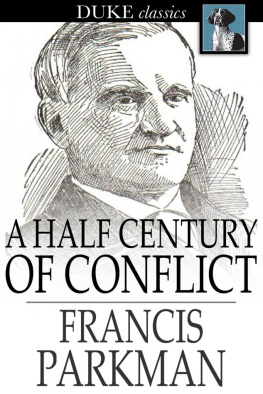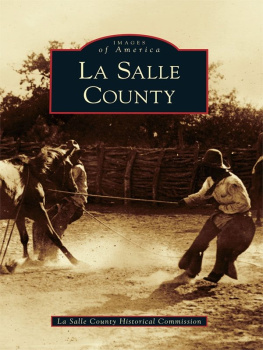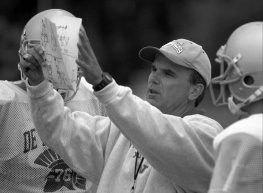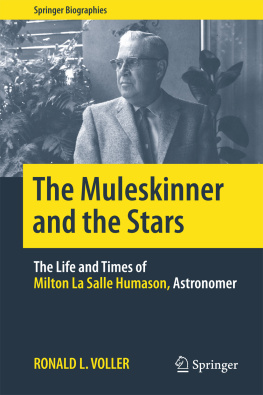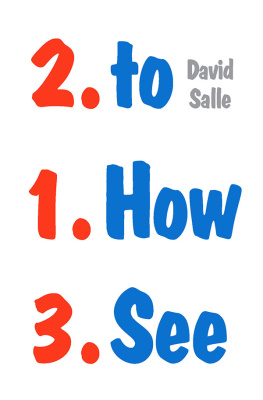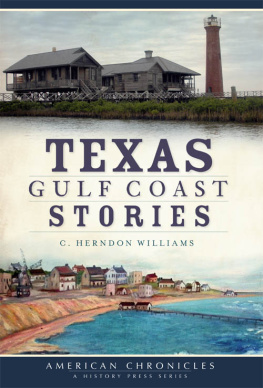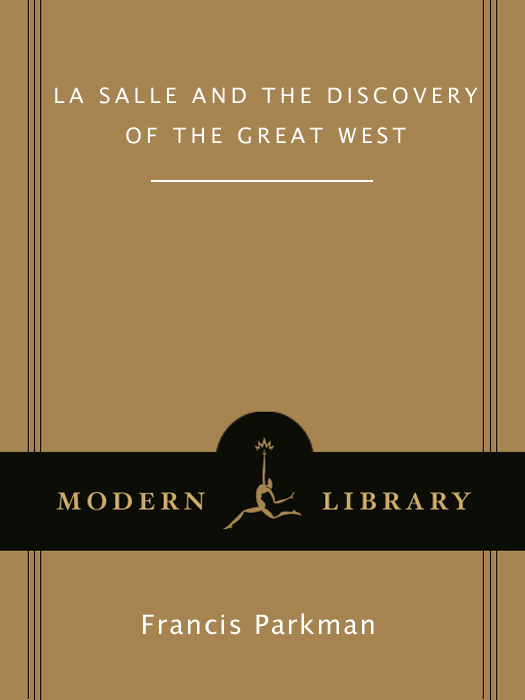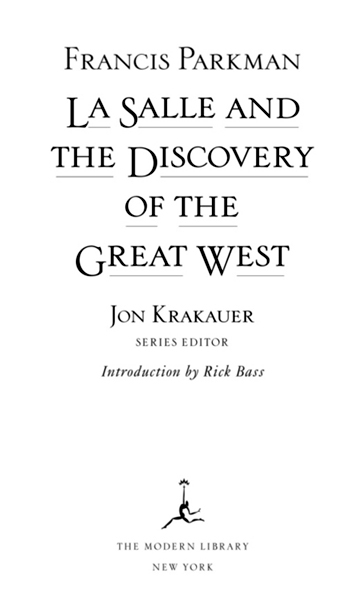1999 Modern Library Paperback Edition
Biographical note copyright 1999 by Random House, Inc.
Series Introduction copyright 1999 by Jon Krakauer
Introduction copyright 1999 by Rick Bass
All rights reserved under International and Pan-American Copyright Conventions. Published in the United States by Random House, Inc., New York, and simultaneously in Canada by Random House of Canada Limited, Toronto.
Modern Library and colophon are registered trademarks of Random House, Inc.
LIBRARY OF CONGRESS CATALOGING-IN-PUBLICATION DATA IS AVAILABLE
eISBN: 978-0-679-64229-9
Modern Library website address: www.modernlibrary.com
v3.1
F RANCIS P ARKMAN
Francis Parkman, whose epic seven-volume study, France and England in North America, established him as one of this countrys greatest historians, was born in Boston on September 16, 1823. His father was a prominent minister and the son of a wealthy merchant; his mother was descended from Reverend John Cotton, the famous New England Congregationalist. Frail health compelled Parkman to spend his early childhood on a farm in neighboring Medford, where he came to love outdoor life. After attending the Chauncy Hall School in Boston he entered Harvard in 1840. Under the influence of Jared Sparks, the colleges first professor of modern history, the eighteen-year-old sophomore initially envisioned his monumental account of the conquest of North America. My theme fascinated me, and I was haunted with wilderness images day and night, recalled Parkman, who visited many of the battlefields of the French and Indian Wars during summer holidays. Though illness forced him to temporarily abandon his studies, he earned an undergraduate degree in 1844, with highest honors in history as well as election to Phi Beta Kappa, and completed Harvard Law School two years later.
In the spring of 1846 Parkman set out with his cousin Quincy Adams Shaw on a strenuous five-month expedition to the Far West. Shortly after returning to Boston he suffered a complete nervous and physical collapse and remained a partial invalid for the remainder of his life. While recuperating he dictated The California and Oregon Trail (1849), a gripping account of his wilderness adventures. Subsequently reissued as The Oregon Trail, the perennially popular travelogue was praised by Herman Melville and later hailed by Bernard DeVoto as one of the exuberant masterpieces of American literature. Still battling severe headaches and partial blindness, Parkman finished History of the Conspiracy of Pontiac (1851), a prelude to his epic lifework. Over the next decade recurring neurological problems impeded progress on France and England in North America, but he managed to write Vassall Morton (1856), a semiautobiographical novel, and The Book of Roses (1866), a study of horticulture.
Pioneers of France in the New World, the first volume of Parkmans monumental account of the struggle between England and France for dominance of North America, was published in 1865. Faithfulness to the truth of history involves far more than a research, however patient and scrupulous, into special facts, wrote Parkman in his Preface to Pioneers. The narrator must seek to imbue himself with the life and spirit of the time. He expanded his dramatic history of the American forest with The Jesuits in North America in the Seventeenth Century (1867), The Discovery of the Great West (1869), The Old Rgime in Canada (1874), and Count Frontenac and New France under Louis XIV (1877). Like fellow historians of the Romantic school, Parkman believed that the recreation of the past demanded imaginative and literary art, observed historian C. Vann Woodward. He looked to such writers as Sir Walter Scott, James Fenimore Cooper and Lord Byron more than to historians for inspiration in his narrative style.
Fearing he might not live to complete his vast work, Parkman next wrote Montcalm and Wolfe (1884), the climactic final volume of France and England in North America. I suppose that every American who cares at all for the history of his own country feels a certain personal pride in your work, Theodore Roosevelt wrote Parkman. Henry Adams said Montcalm and Wolfe put Parkman in the front rank of living English historians, and Henry James called it truly a noble book [that] has fascinated me from the first page to the last. Arthur Schlesinger, Jr., stated: Montcalm and Wolfethe tale of how half the continent changed hands on the Plains of Abraham before Quebecis romantic history at its most vivid and compelling. A Half-Century of Conflict, the sixth volume in the series, appeared in 1892, a year before Francis Parkmans death in Boston on November 8, 1893. Two works culled from his papers were published posthumously: The Journals of Francis Parkman (1947) and Letters of Francis Parkman (1960).
In the tradition of Gibbon and Prescott, Parkmans achievement was seeing the human and the personal in the great movements of history, wrote Daniel J. Boorstin. Just as Gibbon had been engaged by the spectacle of Roman grandeur in decline, and Prescott by a new Spanish empire in creation, Parkman was entranced by the wilderness struggles of France and England in North America in the making of a new freer world. And Edmund Wilson observed: The genius of Parkman is shown not only in his disciplined, dynamic prose but in his avoidance of generalizations, his economizing of abstract analysis, his sticking to concrete events. Each incident, each episode is different, each is particularized, each is presented, when possible, in sharply realistic detail, no matter how absurd or how homely, in terms of its human participants, its local background, and its seasonal conditions. He had a special sensitivity to landscape and terrain, a kind of genius unequalled, so far as I know, on the part of any other important historian, without which such a story could hardly have been told. The clarity, the momentum, and the color of the first volumes of Parkmans narrative are among the most brilliant achievements of the writing of history as an art.
I NTRODUCTION TO THE M ODERN L IBRARY E XPLORATION S ERIES
Jon Krakauer
Why should we be interested in the jottings of explorers and adventurers? This question was first posed to me twenty-four years ago by a skeptical dean of Hampshire College upon receipt of my proposal for a senior thesis with the dubious title, Tombstones and the Mooses Tooth: Two Expeditions and Some Meandering Thoughts on Climbing Mountains. I couldnt really blame the guardians of the schools academic standards for thinking I was trying to bamboozle them, but in fact I wasnt. Hoping to convince Dean Turlington of my scholarly intent, I brandished an excerpt from The Adventurer, by Paul Zweig:
The oldest, most widespread stories in the world are adventure stories, about human heroes who venture into the myth-countries at the risk of their lives, and bring back tales of the world beyond men. It could be argued that the narrative art itself arose from the need to tell an adventure; that man risking his life in perilous encounters constitutes the original definition of what is worth talking about.
Zweigs eloquence carried the day, bumping me one step closer to a diploma. His words also do much to explain the profusion of titles about harrowing outdoor pursuits in bookstores these days. But even as the literature of adventure has lately enjoyed something of a popular revival, several classics of the genre have inexplicably remained out of print. The new Modern Library Exploration series is intended to rectify some of these oversights.


